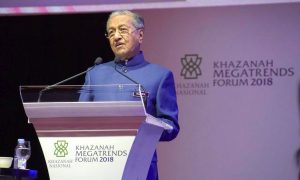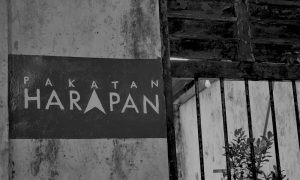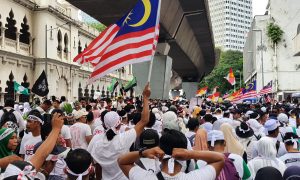Editor’s note: New Mandala’s guest editor for the “Changing Malaysia” series, Prof Meredith Weiss, interviewed Shadow Finance Minister Khairy Jamaluddin in March 2019. The transcript has been lightly edited and condensed.
MW: What has been the hardest thing for you in transitioning from government to opposition?
KJ: Finding ways to occupy my day. Seriously … I think just in terms of understanding the role of being in opposition, I think that’s taken some getting used to. But I would like to think that we’ve onboarded ourselves much quicker as opposition than some ministers have. And I think of course the challenge is to try to operate in an environment where we are bereft of support from government agencies. Barisan Nasional has been in government since independence, and sometimes we conflate party and government. That’s an actual tendency for long-entrenched, established parties. And once that support has been removed, where there are resources—financial, human resources and other advantages that we had when we were in government—that of course poses its own set of challenges, that we have to start to create a support service, in this environment, that is independent of government.
Have you done that as the BN or as UMNO specifically, or do you collaborate with PAS? In other words, is there a coordinated opposition, or is it just UMNO?
We do at the BN level, so, for instance, at the parliamentary level, we have a strong secretariat that we fill with our own independent research capabilities. So there are official parliamentary research capabilities that are meant to be bipartisan, but we also have our own BN parliamentary support unit and secretariat. And that services all Barisan Nasional members of Parliament. We have collaborations with other parties, not just PAS but also the GPS from Sarawak. In terms of common positions, in terms of shared campaign strategy, and also in terms of electoral cooperation, as you’ve seen in the last couple by-elections.
Has UMNO as a party changed the way that it operates since the election, structurally or otherwise?
The analogy would be a big tanker: when you change course, it takes a long time for it to move away from the iceberg right ahead.
Are there changes that you would like to see in UMNO, that maybe haven’t happened yet?
Yes, I think there are structural changes that I think are quite slow in happening. I know they are trying to make it happen, to decentralise more decision-making to the states, to ensure that becoming a member is easier, to attract more talent to the party. These are structural changes that I think will take place, and should perhaps be at a faster pace.
But I think the bigger concern is not so much structural; rather, the ideological future of the party. That’s more of a concern for me, because … I may be the only one who has articulated a future direction for UMNO that you would like to hear, but there are plenty of others who have articulated a different ideological future for UMNO, which is quite clear in its articulation. And that is, of course, simply put, the Malay–Muslim vision. And that is very clear. I articulate a vision that is unfortunately in a very, very small minority right now. It’s very difficult to sell, because tactically, obviously, the Malay–Muslim option is working.
Shortly after GE14, you had expressed a vision of shifting to something really much more like Onn Jaafar’s vision of UMNO. Is that still what you’d like to see for the party?
Yes, of course! It must be, but then, you see, I’m confronted with two big challenges. One is that the tactical alliance with PAS, which focuses on the Malay–Muslim polity, seems to be working, at least for by-elections—I have reservations about, when you extrapolate to the general elections, whether or not it is enough. And secondly, the non-Malay voting community, particularly Chinese and Indians, have shown a reluctance to swing their support in the recent by-elections, except maybe in Rantau, and have indicated that it will be very difficult for us to win over support from those communities. So when you present a vision that is more inclusive, a vision that is rooted in an Onn Jaafar multiracial idea, it’s not getting resonance, because it involves two things (that were mentioned before).
What do you see as the benefit of having UMNO take that stance, instead of having that be the BN’s ambit, in which UMNO has the Melayu segment, but inclusivity comes through the coalition framework?
Well, it’s a bit schizophrenic, because, you know, when you go too far right as a component party, then it really dilutes the multiracial message that you’re sending as a coalition. And this is part of the reason why we’ve seen a slow death of the MCA and the MIC—the MCA in particular. One is, of course, their internal weaknesses, and their limitations, but it’s also because, I think, the primacy of that ethnocentric position that UMNO has taken has also resulted in Chinese voters’ not supporting us. I mean there’s this constant debate within Barisan Nasional as to why Chinese voters don’t support us. UMNO will blame MCA and say you are useless, you can’t get support from the Chinese community, which is partly true. And MCA will say that it’s because you all are so racist, that we can’t possibly sell BN, which is also partly true. So it’s very difficult, because you are often in this sort of stalemate.
Do you try to proselytise for this vision within the party—do you offer ways in which one could combine both visions?
I have lost the leadership of the party, and I’m marginalised on a daily basis in the party, so it’s very difficult for me right now. And I have to see and weigh the options of how to get this message back on track. If I do it now, it almost falls on deaf ears, because people are saying, you know, we won in Cameron Highlands, we won in Semenyih, and in Rantau again. And that’s because PAS … I mean, there’s this orgy of celebrating this union, which is preventing anything else from being discussed in the party.
In the past, you had been trying to cultivate young leadership within UMNO. Are you still involved in any of that?
I am not involved in that, but I am setting up a centrist think tank thing, which is not aligned to the party, but of course aligned to me (thinking agenda). I hope I can use that at least to try to expand the centrist space that I represent, and hopefully try to reclaim some of the debate back from the Malay–Muslim agenda.
What do you hope to focus on, with the think tank?
It’s a think tank dedicated to centrist views.
Do you have a first project you want it to take up?
Yes, we’re looking at basic economic issues first—costs of living, we’re looking at certain sectors, farmers, things like that, to see how we can offer centrist solutions, not entirely government subsidies, not entirely market forces, but try to expand it. We feel that by starting with economic issues, it’s less controversial than diving straight into identity politics.
Speaking of centrism, one of the things that has gotten you into the media of late is the fact that you have actual friendships, it would appear, with people in other parties. Can you say a bit about your views on the space for bipartisanship in Malaysia’s parliament?
By virtue of being a shadow finance minister (in BN’s Shadow Cabinet), I am on the Parliamentary Special Select Committee on Budget, which is chaired by Mustapa Mohamed, former minister, presently with Bersatu. I am the Barisan Nasional representative. There are two opposition members, myself and Alex Linggi from GPS in Sarawak. We’ve had three meetings so far. In my first meeting, I suggested to the committee that we leave the political theatrics for the main chamber, and that this committee try to focus on trying to come up with bipartisan positions on the budget, whether it is monitoring the previous year’s budget or in preparation of the next year’s budget. And I’m happy to say that over the last three meetings, we have demonstrated some level of bipartisan camaraderie. It doesn’t mean that we are not partisan. Just to give you an example, one of the matters that is being considered by the committee right now is the issue of the national debt and its definition. The government’s position is that the national debt has ballooned to 1 trillion ringgit because of excessive profligate spending by Barisan Nasional, and of course, our position is that that’s an unfair characterisation of the federal government debt. So, we have had a very robust discussion. I’ve presented my views as to why that’s not entirely accurate; they presented their views as to why that is more accurate. And I think we will come up with a statement that we’ll be reporting back to Parliament on the national debt, which will include the dissenting opinion if necessary from myself. So I think that goes to show the committee can work, even though there’s dissenting opinion. It’s very professional. There’s no name-calling, whatever it is. We get on quite well amongst each other.
To what extent had that sort of thing happened in the past, maybe behind the scenes?
There are behind the scenes discussions, obviously, and I think the bark in the chamber is much worse that whatever conversation you have outside. Of course, it’s politics, so there are some personal rivalries and enmities which you can’t ignore. But for the most part, I don’t think we are in a situation where you can’t sit down and discuss things.
Which of the parliamentary reforms underway do you think are most likely to find support in the BN or in UMNO specifically?
I think the creation of these committees is a good thing, because obviously that gives an opportunity for the committees and therefore opposition members to shape government policy, especially legislation. Early days, obviously, because the committees have just been set up. We have issues with support services, research, budgeting, which informs, of course, the future role of the committees. The committee should be not just a place where you come and give testimony, but it should also be a place where legislation needs to pass through first, before it gets to the main chamber. And that’s not happened yet. But that will take time. So I think that’s a reform that we support. And things like, of course, the chair of the Public Accounts Committee, give it to the opposition—obviously those are things that we support, because it gives us a role in oversight and contributing toward the check and balance of Parliament.
Is your retrospective view of your time as Government changed by the fact of your being in Opposition? Are there things that, looking back, you think you would have done differently?
You know, we are prisoners of our own circumstances. My personal view has not changed very much. I believe in a lot of these institutional reforms, as an opposition, just as I believed in them then as government. But being a prisoner of circumstances, being part of a team that did not support the implementation of some reforms as I imagine should have been done, I think really is a political decision that I made. And I have to live with that.
You said there are some efforts underway to change things structurally in the party. Who is leading the effort to change things like devolving power to the state level or making it easier to join?
Well, it should be the Supreme Council … it is the Supreme Council. I am not part of the Supreme Council. From what I understand, I think a lot of the concern of the party right now is to cultivate the relationship with PAS, and also administratively, it’s to get as much financial resources as possible, to try to run the party for the next few years. So because of the preoccupation with those big concerns, the realignment with PAS as well as the financial viability of the party, some of these other reforms have maybe taken a back seat, been put on a back burner. I’m not sure, that’s something that needs to be directed to the leadership. I think the new leadership under Mohamed Hasan has good sensibilities.
How UMNO might differentiate itself from other parties, or where do you think its primary sources of growth might be? It’s a fairly crowded party landscape in Malaysia. So even if you’re talking about this more inclusive vision, there’s still an element of poaching, whether from MCA, or Keadilan, or Bersatu that goes into that. Where in your ideal UMNO would the primary effort at recruitment be?
Malay middle class, that’s what we lost the last election. If we get the Malay middle class we win the elections.
Was that because of corruption issues?
[Nods] It was, the 10, 20 per cent swing of the Malay middle class. Everyone knows this. And the Malay middle class is multi-demographic—it’s young people, men and women, urban and suburban.Since then have you seen particular segments coming back?
That particular segment has come back, but for the wrong reasons—not the wrong reasons, but for a particular reason, which I am not entirely comfortable with.
As someone who is no longer in power in the party, how do you work to try to shift that direction? Is there a group of you that are working together?
At the moment, it’s a very small group. And it’s very difficult. Let’s put it this way: when recently MCA and MIC were deciding whether or not to stay or leave because of UMNO’s cooperation with PAS … You see, I think my colleagues see the cooperation with PAS in a very one-dimensional and instrumental view. One-dimensional in that they see it in terms of Malay–Muslim identity politics, and instrumental as in, because it delivers results. To me, if you want to forge this union, it cannot just be based on these two things. So I said if you want to continue with this tactical cooperation and later, perhaps, political alliance with PAS, it must be based on common values and principles, that MCA and MIC can also shape. And I reminded them that when PAS worked together with DAP, it wasn’t just for instrumental purposes or winning elections, but they actually came together and defined what Pakatan Rakyat was back then, or what Barisan Alternatif was back then, against cronyism, for good governance, things like that. We have not done that. We’ve done it only in isolation for the Malay-Bumiputera community, to protect Islam. And that’s not a vision that can be shared throughout the BN. So I told [Wee] Ka Siong and Saravanan [Murugan] from MCA and MIC, I said you all must sit down with UMNO, with BN, come up with that common principle that is dedicated toward multiracial politics, toward good governance, toward socioeconomic justice, towards empowering the B40, and then present that to PAS, and say, can you agree to this? Now, if you can agree to that, then it’s okay. But at the moment, that’s not okay. I have been suggesting this, and I suppose some people are listening.
In your own party or in those parties?
In those parties. [laughs]
What do you see as the future of the BN, given what you’ve just said? Would you expect that by GE15, there will be a BN?
I hope there will be, because even if our component parties can’t win seats, or can’t win many seats, it still is important that your DNA is forged out of a multiracial coalition, you know, even if you do end up with a Malay–Muslim parliamentary bloc. Say, for instance, UMNO and PAS win 90 seats—and mathematically it can happen—and then we get 20 plus from Sabah and Sarawak. Then you have a government already, but if the DNA is still multiracial, then you can start to build the strength of your component parties once again—senatorial appointments, bringing them into government, things like that. But if you abandon them completely, then you could possibly have a monoethnic government, which is not a good thing, for many reasons obviously. So whether it’s still the MCA, it’s still the MIC, other component parties—that’s something that, you know, time will tell. Whether or not BN direct membership will growth in strength … So I think there are disparate reasons and ways forward; I’m not quite sure which one will succeed.
I keep hearing of bipartisan running events and so on. Is that political? I don’t recall seeing such things, of what seem to be friendly initiatives across party lines. Is it something about the transition that made such things possible, or is just that people assumed you were too busy before?
I think that, you know, I’ve had friendships with some of these people from long-time. I think now, having time on my hands … And some of us, I think we have very similar views. The run is with Nazmi—he’s also a back-bencher, we have some free time, a lot of common views. I think you should have friendship in politics, even if it’s bipartisan friendship. We’re the same generation.
What keeps you in UMNO? In some ways what you’re articulating is a message that is, as you have said, out of sync with the mainline of the party at this point, and could be seen as more in line with the ideology of some other parties. But you clearly are committed to UMNO.
Two reasons. One is I do feel a sense of political obligation because I contested as an UMNO/BN candidate and I think that that should mean something. But secondly, you can cross a point of no return. If that particular platform of yours that you contested on is completely unrecognisable, then I think that obligation is null and void.
An interview with Malaysia’s Foreign Minister, Saifuddin Abdullah
Answering New Mandala's questions on the "New Malaysia" and its place in the region and the world.
We will know. It’s one of those things, you know, like you know you’re with the right person. [laughs] Indescribable, but you know. I’m not quite there yet though! But the point is that I’m still there because I still feel that I can recognise that particular platform. Even though it’s in a dark recess of the party right now, it’s still there.
The other thing is—I want to expand on this point—for right or wrong reasons, I think the Malay discontent is real. It’s real. And I want to find a way of how UMNO can address that discontent without resorting to an almost exclusivist identity politics from which we cannot come back. Which is essentially what UMNO was in the past—we looked after the Malay concerns, but never, never at the expense of others. And I think we are coming really close to that right now. I still believe in that vision and I still feel that the Malay community is underrepresented by Pakatan Harapan. So the option of me leaving UMNO and starting another party may not be attractive right now because you simply don’t have that traction. And if you don’t have that traction, you can’t address this Malay discontent, which is very real.
What else would you like the world to know about you, your political future, UMNO’s political future, whether there’s a New Malaysia?
I am most concerned about the future ethnic divisions in Malaysia. And I think they have become more pronounced post-GE13. New Malaysia was meant to usher in a Malaysia that could look beyond these ethnic divisions, but I think they have been exacerbated by both sides. I think the Pakatan Harapan government has consciously or unconsciously created this Malay discontent. Of course it’s capitalised on by sections of PAS and UMNO. They’re opposition parties—it’s what some in the opposition do. I mean, I’m not a big fan of dog-whistle politics, but you can’t stop certain people from doing that. And Pakatan Harapan has not risen to the challenge. It’s a bit too late, to be honest.
So my concern is that the unintended consequence of New Malaysia has been a very divided Malaysia. That’s why I feel that for all his shortcomings – and he has many, many shortcomings – I think that Anwar is perhaps most suited to become Prime Minister. Because his strength – perhaps his only strength – is that he’s able to navigate identity politics probably better than anybody else in Malaysia, and certainly better than Mahathir. So perhaps on that one singular strength alone, it should be his time.
 Facebook
Facebook  Twitter
Twitter  Soundcloud
Soundcloud  Youtube
Youtube  Rss
Rss 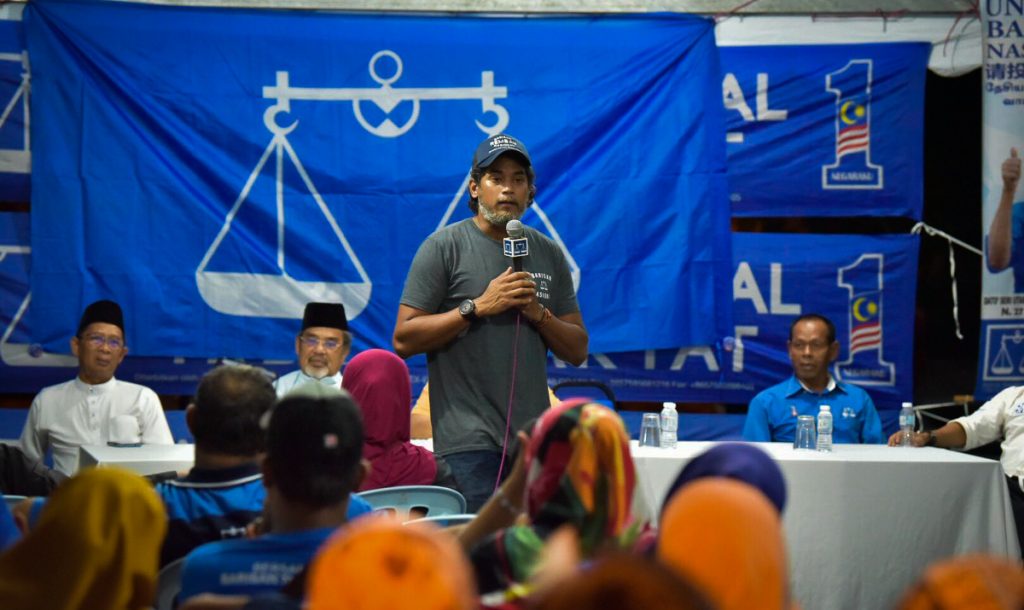
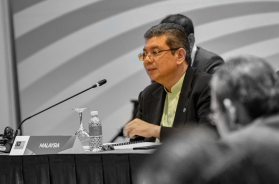
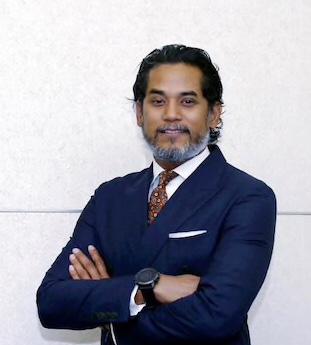 Hon. Khairy Jamaluddin is the Member of Parliament, representing the Rembau constituency in Negeri Sembilan since 2008. He served as the Minister of Youth and Sports from May 2013 until May 2018 and the Chairman of the youth wing of the previous ruling coalition, Barisan Nasional (BN), from 2009 to 2018. He currently holds a position in the bipartisan Parliamentary Select Committee on Budget, while simultaneously working as the Shadow Finance Minister from BN. Prior to joining politics, he worked in journalism, policy and investment banking. Khairy earned a degree from the University of Oxford and a Master’s degree from University College London. He was named a Young Global Leader by the World Economic Forum in Davos in 2005 and was named as one of the Asia 21 Fellows by the Asia Society in 2006. Khairy was also elected as Visiting Fellow at the Oxford Centre for Islamic Studies in 2002. In 2012, he was appointed as the Chairman of Perbadanan Usahawan Nasional Berhad (PUNB).
Hon. Khairy Jamaluddin is the Member of Parliament, representing the Rembau constituency in Negeri Sembilan since 2008. He served as the Minister of Youth and Sports from May 2013 until May 2018 and the Chairman of the youth wing of the previous ruling coalition, Barisan Nasional (BN), from 2009 to 2018. He currently holds a position in the bipartisan Parliamentary Select Committee on Budget, while simultaneously working as the Shadow Finance Minister from BN. Prior to joining politics, he worked in journalism, policy and investment banking. Khairy earned a degree from the University of Oxford and a Master’s degree from University College London. He was named a Young Global Leader by the World Economic Forum in Davos in 2005 and was named as one of the Asia 21 Fellows by the Asia Society in 2006. Khairy was also elected as Visiting Fellow at the Oxford Centre for Islamic Studies in 2002. In 2012, he was appointed as the Chairman of Perbadanan Usahawan Nasional Berhad (PUNB).
